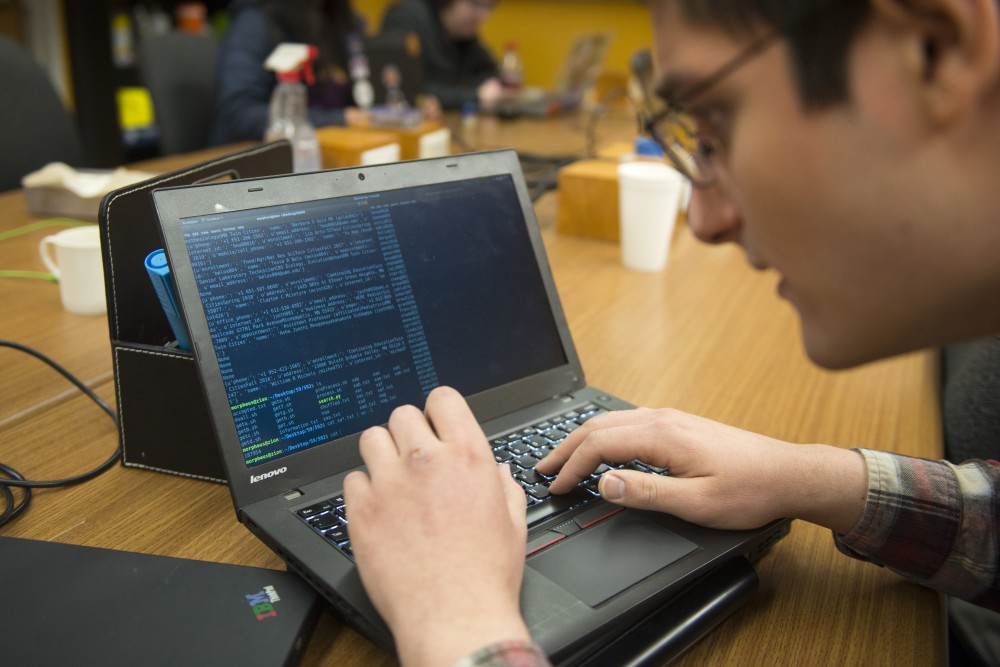Second-year student Sina Roughani hoped to impress his crush last year with an atypical birthday gift — improving University of Minnesota’s student data privacy policy.
The electrical engineering student devoted much of his first semester at the University in 2017 to advocating for a change in the student records policy. Roughani became concerned when he found information like students’ home addresses and phone numbers were publicly available on the University’s People Search database. He focuses on student data privacy by helping student government leaders push for less available information online.
By using his computer science knowledge, he discovered weaknesses in the database’s security, and voiced his concerns to President Eric Kaler, University administration, peers and the Minnesota Student Association.
MSA passed a resolution in December suggesting the University publish less student information by default and be more transparent in how the information is being used.
During his first semester at the University, Roughani approached students in dining halls and asked if they knew how much information was on the public database. If not, he helped them suppress the information.
“Even though there is an option in MyU for people to turn it off, I talked to a bunch of people in the dining halls … and nobody seemed to know about it,” Roughani said.
Third-year student Kayla Engelstad said she first found out about what information was on the database from Roughani because she often frequented Keller Hall’s Exceed Lab, one of the spaces Roughani would broadcast his message.
“I was kind of surprised especially because of how tech savvy a lot of people around the lab are, but not many people were aware of it. I was kind of shocked that all of that [information] is available,” Engelstad said.
However, Engelstad found many students were not concerned their information was public on the People Search database.

In an effort to demonstrate how poorly secured the database was to administration, Roughani gathered as much information as he could — even using the dark web to request mass amounts of data anonymously.
During a 2017 MSA forum meeting, Roughani presented his findings, concerns and suggestions for improvement.
MSA Representative to the Board of Regents Austin Kraft, the former infrastructure committee director, was present for Roughani’s presentation and noted the knowledge that Roughani demonstrated.
“There was this open discussion and I’ll never forget … this student in the back [had] just a very well organized breakdown of ‘any person can access your email address, your physical address, your phone number,’” Kraft said. “I had only been [at the University] for two semesters, and I didn’t know that.”
While student information privacy was already a topic being discussed in MSA and between the student representatives to the Board of Regents, Kraft said Roughani’s presentation added momentum to MSA’s focus on the issue.
“I do know that it put the topic on a lot of people’s radars and influenced the inclusion of it as a component of last year’s [student representative report to the Board of Regents],” Kraft said.
After feeling unsatisfied with the results of his presentation, Roughani decided to reach out to Kaler personally to further advocate for change to the University’s policy.
He said he printed out hundreds of students x500’s in tiny font, and then created a stack of papers encompassing the information of thousands of University students. He had accessed this information through a program he created and left the stack of papers with President Kaler’s secretary.
“I thought that by making a big deal out of it, by just showing how many people are affected, that [it] would spark action,” he said.
Without response from Kaler, Roughani continued researching the issue, comparing the University’s policy to other universities. He found many universities do not publicize the same amount of information as the University of Minnesota.
His work didn’t come without a cost, however, as he began to fall behind in his school work due to his intense focus on the issue.
“I thought that working on this would be so great, because I would bring about so much good change, that I decided to spend a lot more time working on this instead of focusing on my classes,” Roughani said.
Kraft said he hopes to include Roughani in future MSA discussions surrounding data privacy.
“He’s done an incredible amount of work and he knows his way around the system. … He absolutely deserves credit for his work on this important technical issue,” Kraft said. “Moving forward, I am hopeful that he can be in on those conversations.”
Kraft emphasized that student data privacy will be an ongoing issue and is something that will take time and consideration.
“It seems like a very straightforward, simple fix, [but] it’s just something that takes more caution than at first glance,” Kraft said.








